
Dame Margaret Drabble, Lady Holroyd, is an English biographer, novelist and short story writer.
Ian R. MacLeod is a British science fiction and fantasy writer.

The Peppered Moth is a 2000 novel by English writer Margaret Drabble; it is her fourteenth published novel. The novel follows the fictional experiences of three generations of women within one family, and contains several elements that are loosely based on Drabble's own biographical experience.

Jerusalem the Golden is a novel by Margaret Drabble published in 1967, and is a winner of the James Tait Black Memorial Prize in 1967.

Lighthousekeeping is a 2004 novel by Jeanette Winterson. The novel is the first in a seven novel cycle. The novel depicts the perilous unbalanced psychology of the narrating character Silver, who becomes an apprentice to a lighthouse keeper.
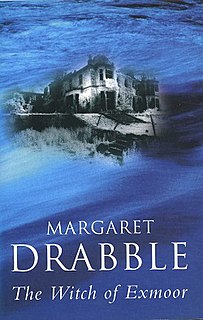
The Witch of Exmoor is a 1996 novel by Margaret Drabble. The novel is a social novel, with a focus on exploring the state of post-Thatcher Britain through the Dickensian satire of the Palmer family. The title describes the satirical protagonist, Frieda Palmer, who provides the source of much of the social commentary.

The Middle Ground is a 1980 novel by British novelist Margaret Drabble. It is her ninth published novel. The novel explores the "crisis of British urban life" through the eyes of a middle aged journalist, Kate Armstrong.
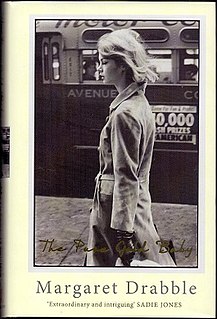
The Pure Gold Baby is British novelist Margaret Drabble's 18th novel, first published in 2013. The novel was her first novel to be published in seven years, following The Sea Lady. In 2009, Drabble had pledged not to write fiction again, for fear of "repeating herself."
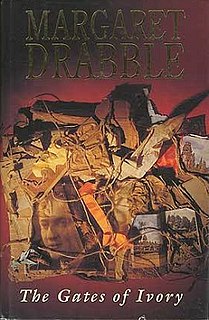
The Gates of Ivory is a 1991 novel by novelist Margaret Drabble. The novel is the third in a series of novels, following The Radiant Way and A Natural Curiosity. The novel continues the stories of several middle aged intellectuals introduced in the last two novels. The novel also introduces a new character, Stephen Cox who is loosely based on J.G. Farrell.

The Needle's Eye is a 1972 novel by British novelist Margaret Drabble. The novel was well received by reviewers, like contemporary novelist Joyce Carol Oates. Though it was her fifth novel, Drabble described it as her first time that she could "actually write a novel" expressing what she wanted to write.
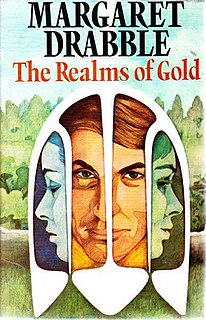
The Realms of Gold is a 1975 novel by British novelist Margaret Drabble. The novel explores the mid-life experiences of anthropologist Frances Wingate and her affair with Karel Schmidt.

The Radiant Way is a 1987 novel by British novelist Margaret Drabble. The novel provides social commentary and critique of 1980s Britain, by exploring the lives of three Cambridge-educated women with careers as knowledge professionals.
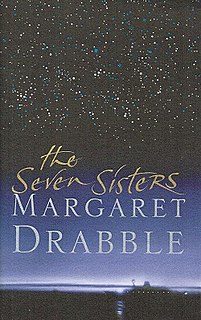
The Seven Sisters is a 1992 novel by British novelist Margaret Drabble. The novel reflects on a mid-life crisis of an estranged Candida, when she moves to a rundown London apartment. The novel largely follows Candida's evasive and sometimes deceptive representation of events, including an epistolary section which is her "computer diary".

A Natural Curiosity is a 1989 novel by Margaret Drabble. The novel is an unintended sequel to Drabble's 1987 novel The Radiant Way, follows the lives of the three protagonist women first introduced in that novel. The novel continues Drabble's interest in exploring the contemporary experience of the British middle class through the eyes of women.

Hag-Seed is a novel by Canadian writer Margaret Atwood, published in October 2016. A modern retelling of William Shakespeare's The Tempest, the novel was commissioned by Random House as part of its Hogarth Shakespeare series.
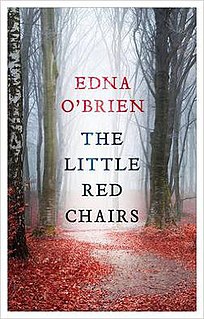
The Little Red Chairs is a 2015 novel by Irish author Edna O'Brien, who was 85 at the time of publication. The novel is O'Brien's 23rd fictional publication.
Click & Collect is a British comedy television film directed by Ben Palmer, written by Joe Tucker and Lloyd Woolf, and starring Asim Chaudhry and Stephen Merchant.
Will Eaves is a British writer, poet and professor at the University of Warwick.

The 2006 Nobel Prize in Literature was awarded to the Turkish writer Orhan Pamuk "who in the quest for the melancholic soul of his native city has discovered new symbols for the clash and interlacing of cultures."
















